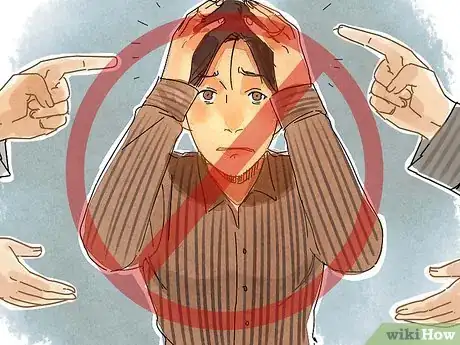This article was co-authored by Liana Georgoulis, PsyD. Dr. Liana Georgoulis is a Licensed Clinical Psychologist with over 10 years of experience, and is now the Clinical Director at Coast Psychological Services in Los Angeles, California. She received her Doctor of Psychology from Pepperdine University in 2009. Her practice provides cognitive behavioral therapy and other evidence-based therapies for adolescents, adults, and couples.
There are 7 references cited in this article, which can be found at the bottom of the page.
This article has been viewed 43,082 times.
Life can be full of difficulties and stressors, and sometimes our fears can overtake our sense of reason. However, if you allow your anxieties about things you cannot control to consume you, you will find it hard to live a life that is joyful and happy. Stop worrying about things you cannot control by managing and diminishing your worries through practicing self care and finding ways to limit your fears. You can also work to challenge any negative thoughts that you may have by considering the facts and finding reasonable alternatives to your anxiety.
Steps
Managing Your Worry
-
1Set a time limit on a worry. When you begin to worry about something, rather than simply trying to put it away from your mind, set a time limit on how long you will think about it. Actively trying to forget something often makes you think of that thing even more intensely, so don’t try to ignore your feelings. Allow yourself to think for five or ten minutes, and then move on to more productive tasks.[1]
- Set a timer so you don't lose track of time.
-
2Make a list of your worries. When you are on the job or at school, you will need to be as focused as possible so that you can complete the task at hand. You might have some legitimate worries that you will need to attend to later, but if it can wait, consider making a list instead. Once you are finished with all of your work for the day, you can take a look at this list and address anything that is necessary.[2]
- Use a star or other symbol to mark high-priority worries.
- You might find that your worries have subsided by the end of the day and you may not even need to check this list.
Advertisement -
3Delay your worrying. Another way to place a limit or parameter on your worrying is to find ways to delay it. Perhaps you are in the middle of a very important project but then you start worrying about your children or husband. Commit to finishing at least a portion more of the work that you have to do before you check-in or give in to fear.[3]
- Perhaps you have a presentation to create by tomorrow. Commit to at least creating an outline and some introductory slides before you check in with your family.
- Remember if worrisome thoughts are preventing you from completing the task, write them down.
Challenging Your Thoughts
-
1Gather the evidence. When a worry comes to your mind, consider what evidence you have that would lead you to believe that this worry is real. This will help you assess whether or not your worry is even worth spending time thinking about.[4]
- For instance, if you call your husband and he doesn’t answer the phone, you might worry that he is cheating. Consider factors like his character, his supposed location, and any other information that could negate this notion.
-
2Consider probability. After gathering evidence, consider the likelihood of this action occurring. Oftentimes, the fears that you have may be a bit far-fetched or unrealistic. Think about how often this has happened in the past, especially to you.[5]
- Maybe your husband's phone dies frequently. His failure to answer the phone is likely a result of a dead battery rather than cheating.
-
3Determine how helpful this worry is. Take some time to consider what worries you are having and then deem them either constructive or unconstructive. This will allow you to know whether or not you should problem-solve or let it go.[6]
- For instance, you might be nervous about a presentation you have coming up. This is good stress because you can use this as an incentive to prepare more. Take a specific action to address the worry, like going through your notecards once more.
-
4Consider whether the issue will matter in the long term. When you are worried about a particular issue, take a moment to think about whether or not you will care about this issue in a week, month, or year. If you will not, try your best to let it go. If it is something that will persist, try to find a way to solve or move past your worry.[7]
-
5Find a more positive way of thinking about the situation. Rather than catastrophizing ordinary situations, consider all of the alternatives to your worry. Perhaps your significant other did not answer your phone call and you have not heard from them in an hour or two. Rather than assuming that they have been hurt, consider whether they might be working, napping, or busy at the moment.[8]
- Call back in a few hours to check-in if you are still worried.
Diminishing Your Worry
-
1Consider any possible solutions. After you have taken some time to de-escalate the worry in your mind, determine if your worry is at all solvable. You cannot control every situation, but you can control some things, including yourself.[9]
- For instance, you might be worried that you will be fired soon. Though you cannot prevent this, you can ensure that you arrive to work on time, complete all of your assignments with diligence and thoroughness, and check-in with your supervisor to discuss your performance.
- An example of something you cannot necessarily control is your children’s driving habits. Though you can tell them not to speed, you cannot be with them at all times. Trust them and continue to impart lessons of wisdom to them.
- Prepare for your worries as much as possible.
-
2Exercise and maintain a healthy diet. Though some of your worries may be solvable, the bulk of them may not be. When you are feeling particularly stressed about things you cannot control, focus on doing things that you can control, such as improving your physical health. Exercising and eating a proper diet can positively impact your brain in many ways.[10]
- When you exercise, your body releases chemicals called endorphins. This release reduces your perception of pain and gives you a more positive mindset.[11]
- Making a switch from high-sugar processed foods to healthier organic whole foods can decrease many mental health symptoms such as stress and worry.
-
3Spend less time with people who cause you stress. Other people may be triggering some of your worries. Maybe you have a friend who worries constantly about her children, and her negative thinking has rubbed off on you. Though you can still be friends with people like this, try to spend less alone time with them.[12]
- If you normally go to lunch once a week, cut it back to once every two weeks.
-
4Confide in those you trust. Another way to combat your worry is by talking to people you trust and who you know have your best interests at heart. Other people can often serve as the voice of reason when you have worries that are unsubstantiated or uncontrollable.[13] Talking to others may help you realize that your worries may not be very rational, or are less troubling than you once thought.
- Let the person know that you want them to help you address the worry, not dwell on it with you.
-
5Learn to accept uncertainty. Work to incorporate more opportunities for spontaneity into your life. If your friends ask to go out tonight, go with them rather than saying you need more time to prepare. Try to be okay with plans or experiences that happen on the fly.[14]
- Try a new hobby or food. Pick out one fear that you have and then try to conquer it. For instance, perhaps you are afraid of heights. Try going to an indoor skydiving area.
-
6Practice mindfulness. Rather than spending so much time in your head, fretting over the future, or worrying about what could happen, take some time each day to be present at the moment. When you feel yourself becoming worried, take some time to reflect on how you’re feeling. Notice your surroundings and how you feel in your body. Actively engage in conversations with others rather than drifting away. Focus on living in the now.[15]
- Try sitting quietly and breathing in and out slowly. You might also want to reflect on a single word or idea like “peace.”
- Practicing mindfulness when you're calm can make it easier to use call on these practices when you're stressed.
-
7See a therapist if worry is affecting you in extreme ways. It’s normal to feel and express worry. However, if the worry or fear becomes a constant reaction, it can have a negative impact on you emotionally, cognitively, and even physically.[16] If you're experiencing worry and it is affecting your entire body in the following ways, consider scheduling an appointment with a qualified therapist so that you can gain more control and get the help you need:
- Inability to function and complete normal tasks throughout the day, due to decreased focus
- Experiencing panic attacks
- Insomnia
- Developing unhealthy eating habits
- Increased frequency of illnesses and fatigue, due to compromised immune system as a result of stress and worry
- Overall body and joint aches
- Increased blood pressure or other heart problems
- Increased use of alcohol and drugs
- Feelings of paranoia or suspiciousness of others or situations
- Feelings of depression and anxiousness
- Obsessive and compulsive thoughts
Expert Q&A
-
QuestionHow do I train myself to not worry?
 Liana Georgoulis, PsyDDr. Liana Georgoulis is a Licensed Clinical Psychologist with over 10 years of experience, and is now the Clinical Director at Coast Psychological Services in Los Angeles, California. She received her Doctor of Psychology from Pepperdine University in 2009. Her practice provides cognitive behavioral therapy and other evidence-based therapies for adolescents, adults, and couples.
Liana Georgoulis, PsyDDr. Liana Georgoulis is a Licensed Clinical Psychologist with over 10 years of experience, and is now the Clinical Director at Coast Psychological Services in Los Angeles, California. She received her Doctor of Psychology from Pepperdine University in 2009. Her practice provides cognitive behavioral therapy and other evidence-based therapies for adolescents, adults, and couples.
Licensed Psychologist This can be particularly difficult, but it typically helps to just slow down and process your thoughts for a minute. Meditating is also a great way to train yourself to control your emotions. If you find it extremely difficult to stop worrying, it may be a good idea to reach out to a therapist!
This can be particularly difficult, but it typically helps to just slow down and process your thoughts for a minute. Meditating is also a great way to train yourself to control your emotions. If you find it extremely difficult to stop worrying, it may be a good idea to reach out to a therapist! -
QuestionHow do I keep my mind calm and peaceful?
 Liana Georgoulis, PsyDDr. Liana Georgoulis is a Licensed Clinical Psychologist with over 10 years of experience, and is now the Clinical Director at Coast Psychological Services in Los Angeles, California. She received her Doctor of Psychology from Pepperdine University in 2009. Her practice provides cognitive behavioral therapy and other evidence-based therapies for adolescents, adults, and couples.
Liana Georgoulis, PsyDDr. Liana Georgoulis is a Licensed Clinical Psychologist with over 10 years of experience, and is now the Clinical Director at Coast Psychological Services in Los Angeles, California. She received her Doctor of Psychology from Pepperdine University in 2009. Her practice provides cognitive behavioral therapy and other evidence-based therapies for adolescents, adults, and couples.
Licensed Psychologist Try using mindfulness, which means focusing on the now. Examine your surroundings and notice how your body feels. This can help you stay in the now.
Try using mindfulness, which means focusing on the now. Examine your surroundings and notice how your body feels. This can help you stay in the now.
References
- ↑ https://www.helpguide.org/articles/anxiety/how-to-stop-worrying.htm
- ↑ https://www.webmd.com/balance/features/9-steps-to-end-chronic-worrying
- ↑ https://www.qld.gov.au/health/mental-health/get-started/a-word-on-worry
- ↑ https://www.qld.gov.au/health/mental-health/get-started/a-word-on-worry
- ↑ https://www.psychologytoday.com/us/blog/in-the-face-adversity/201103/catastrophic-thinking
- ↑ https://www.uofmhealth.org/health-library/uf9897
- ↑ https://www.webmd.com/balance/features/9-steps-to-end-chronic-worrying
- ↑ https://www.psychologytoday.com/us/blog/in-the-face-adversity/201103/catastrophic-thinking
- ↑ https://www.helpguide.org/articles/anxiety/how-to-stop-worrying.htm
- ↑ Liana Georgoulis, PsyD. Licensed Psychologist. Expert Interview. 6 September 2018.
- ↑ http://www.webmd.com/depression/guide/exercise-depression#1
- ↑ https://www.helpguide.org/articles/anxiety/how-to-stop-worrying.htm
- ↑ https://www.helpguide.org/articles/anxiety/how-to-stop-worrying.htm
- ↑ https://www.webmd.com/balance/features/9-steps-to-end-chronic-worrying
- ↑ Liana Georgoulis, PsyD. Licensed Psychologist. Expert Interview. 6 September 2018.
- ↑ Liana Georgoulis, PsyD. Licensed Psychologist. Expert Interview. 6 September 2018.




































































Medical Disclaimer
The content of this article is not intended to be a substitute for professional medical advice, examination, diagnosis, or treatment. You should always contact your doctor or other qualified healthcare professional before starting, changing, or stopping any kind of health treatment.
Read More...